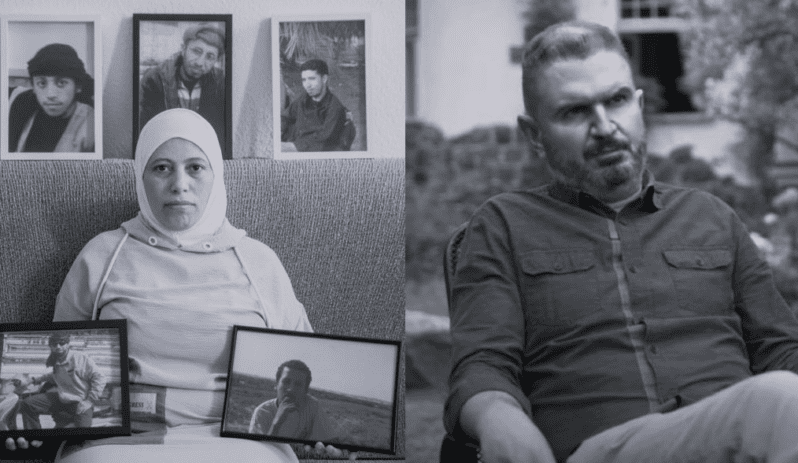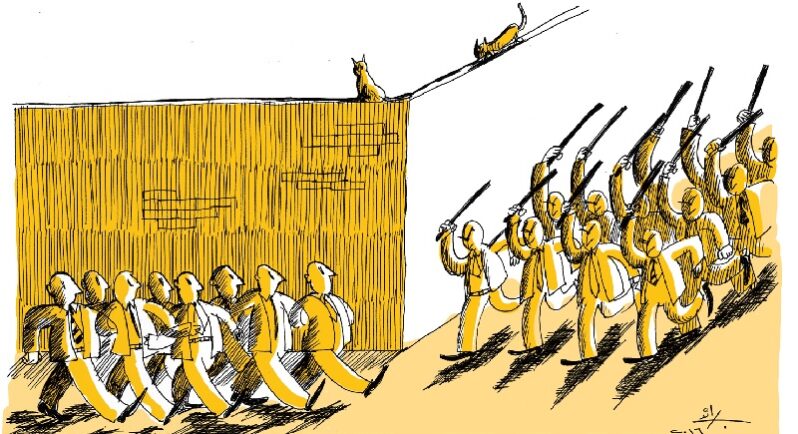Revoking Jordanian Citizenship: Disengagement or Discrimination

International and national organizations, including the National Centre for Human Rights (NCHR), have criticized Jordan because of its withdrawal of Jordanian citizenship from many citizens. The withdrawal came as a result of implementing King Hussein’s decision to cut legal and administrative ties with the West Bank in 1988, which has adversely affected many.
The Green and Yellow Card System
Following the 1948 Arab–Israeli War, the West Bank was administratively ruled by Jordan. According to the Jordanian Nationality Law No. (6) for the year 1954, any non-Jewish person holding Palestinian nationality before May 15, 1948 who was a regular resident in the Hashemite Kingdom of Jordan in the period between December 20, 1949 and February 16, 1954 is deemed Jordanian. Thus, every Palestinian obtained Jordanian nationality except for the people of Gaza since the Strip was under Egyptian administration. After the 1967 War, approximately 200,000 persons from the West Bank sought refuge in Jordan. These were referred to as “displaced” to distinguish them from the 1948 refugees, considering they were Jordanians who did not cross international borders, but moved from one place to another inside the Jordanian territories. Those who came from Gaza were treated differently because they had Egyptian identity documents rather than a Jordanian citizenship.
The movement of the displaced from the West Bank to Jordan was not a difficult process from a legal point of view. However, in order to facilitate movement to and from the West Bank, Jordan introduced a system of color-coded cards known as the card system. Accordingly, West Bank residents were granted green cards so they could visit Jordan, while those residing in Jordan were given yellow cards so they could visit their families in the West Bank.
The Disengagement and its Repercussions
In 1988, King Hussein announced that Jordan “respects the desire of the Palestinian Liberation Organization (PLO), the sole legitimate representative of the Palestinian people [under the Arab League decision in 1974], to separate from us as an independent Palestinian state”. Accordingly, Jordan cut legal and administrative ties with the West Bank in what is known as the “disengagement decision”. It should be noted that the widely-known decision was not issued in writing, but verbally by the Jordanian monarch.
Based on this verbal decision, the disengagement instructions were issued under which West Bank residents lost their Jordanian nationality and Jordanian citizenship rights, and became Palestinians without an official nationality under the Israeli occupation. Pursuant to these instructions, every resident of the West Bank before July 31, 1988 was deemed a Palestinian citizen, not Jordanian. As a result, the process turned one million people in the West Bank from green card holders to stateless Palestinians.
Withdrawing Jordanian Nationality
The Jordanian government continued to withdraw Jordanian nationality from all those the disengagement instructions were applicable to. It did so by refusing to renew their Jordanian passports and by giving them temporary ones that did not carry a national [ID] number assigned to Jordanian citizens only.
The instructions were repeatedly amended, the latest of which occurred in 2011. According to its current form, Jordanian citizenship shall be revoked from those who fall under the following categories:
Any person that has a Palestinian ID and works for the Palestinian National Authority;
Any person that has a valid or expired Israeli occupation ID card;
[US] Green Card holders;
Anyone who left Palestine between 1967 and 1988 and holds an Israeli ID card, among those covered by the census which was carried out by the Israeli occupation after 1967; and
Anyone holding Arab identification documents.
There are no clear figures on the number of people whose citizenship has been revoked. However, some unofficial figures indicate that the Ministry of Interior’s Follow-up and Inspection Department has withdrawn Jordanian nationality from over 2,700 Jordanians between 2004 and 2008 (a report by Human Rights Watch, issued in 2010).[1]
The Jordanian Judiciary’s Position
The revocation of citizenship is considered an administrative decision that can be challenged before the administrative court. Consequently, if there is a mistake in the implementation of the instructions, the decision can be abolished. However, the administrative judiciary has concluded that the disengagement decision under which the written instructions were issued, is a sovereign decision that does not fall within its jurisdiction and may not be appealed. The most recent interpretation by the administrative court was Ruling No. 49/2014.
For example, Decision No. 198/2000 by the High Court of Justice reads: “If the claimant was a minor when the disengagement decision was issued, was not living in the West Bank on the date of issuance, and later did not undergo the census conducted at the bridges, then the claimant is considered Jordanian, and not Palestinian. Thus, the decision to revoke their [claimants] permanent Jordanian passport, instruct to replace it with a temporary one for West Bank residents, remove them from their father’s civil record, and write off their national number from the electronic register on the pretext that they are Palestinian nationals is against the law; therefore, the decision to revoke their Jordanian citizenship should be abolished.” However, if the disengagement instructions apply to the person whose nationality has been revoked, the decision to withdraw citizenship is valid and shall remain intact, as is the case in the High Court of Justice’s Decision No. 129/1998 that reads: “If -through the claimant’s application for a Jordanian passport- the claimant’s presented passport file included Bethlehem as their place of residence, and stamped with the green bridge card…then they are considered a citizen of Palestinian nationality under the legal and administrative disengagement decision, which makes the citizenship revocation decision valid and consistent with the legal provisions.”
It is worth noting that in 2010, through administrative follow-up with the Ministry of Interior, the NCHR was able to retain citizenship to 14 citizens who filed complaints to the center to grieve the withdrawal of their nationality. The then-Commissioner General of the center Muhyiddin Toq said that the response ratio by the Ministry of Interior was 30% of the total number of people (54 persons) who filed complaints.
Gaza’s Palestinians
Palestinian refugees who were expelled from Gaza during and after the 1967 War did not receive Jordanian citizenship since the Gaza Strip was under Egyptian administration. These refugees are entitled to obtain a temporary Jordanian passport which does not grant them enjoyment of full citizenship rights, such as the right to vote in elections and the right to work as government employees. According to the United Nations Relief and Works Agency (UNRWA), the number of refugees from Gaza is around 140,000, most of whom live in the city of Jerash and in Hittin refugee camp in northern Jordan.
In mid-2004, the Ministry of Interior began issuing residence cards to Gaza refugees. Then interior minister, Samir Habashneh, stated that these documents do not have any political implications and do not include a nationality number. He also stressed that they do not grant the holder the right to receive health care, education in public schools, and other services provided exclusively to Jordanian citizens. Gaza refugees can get any of these documents; i.e., the temporary passport or the residence card.
Syria’s Palestinians
Despite the Jordanian Government’s willingness to receive Syrian refugees through different border points, it refused to receive the Palestinians living in Syria for purely political reasons. In a meeting with Human Rights Watch in May 2013, the Royal Hashemite Court Chief and former Prime Minister Fayez Tarawneh defended this policy of denying entry to Palestinians, saying that such a large influx of Palestinians from Syria would change the demographic balance in the Kingdom and impact its stability. Tarawneh added that he doubted Jordan was able to deport the Palestinians legally to Syria immediately after the conflict ends, should they be allowed to enter Jordan today. The fact is Tarawneh’s concerns actually stem from the fear that Jordan would be considered the alternative homeland for the Palestinians, especially since there are many propositions maintaining that it is impossible to send back all Palestinian refugees to their home country as that would not be a logical solution to the Palestinian issue. Palestinians who fled from Iraq in 2003 faced the same problem, as they stayed in camps set up in the border buffer zone between Jordan and Iraq until they were resettled in different countries, most notably, in Brazil.
According to UNRWA, there are about 14,000 Palestinians from Syria in Jordan, living in camps assigned for Syrians or in various Jordanian cities, and posing as Syrians for fear of deportation to Syria. UNRWA is trying as much as possible to provide some form of relief and aid, but the illegal status [of these Palestinians from Syria] stands in the way of their benefitting from government services, such as registration of newborns or documentation of matters relating to personal status, and heightens the risk of exploitation and exposure to deportation by the authorities at any minute.
This article is an edited translation from Arabic.
__________
[1] See: “Stateless Again”, Human Rights Watch, February 2010.



